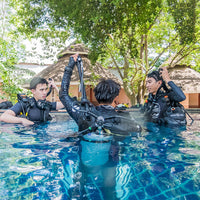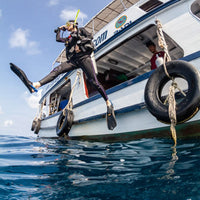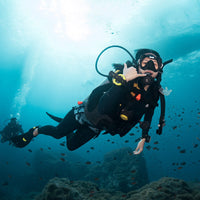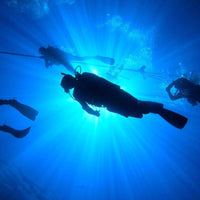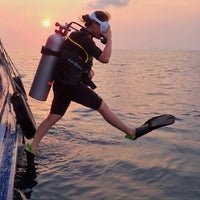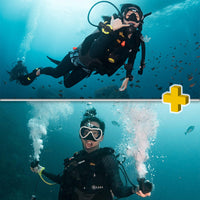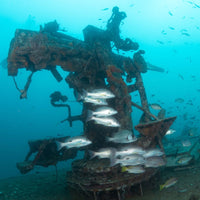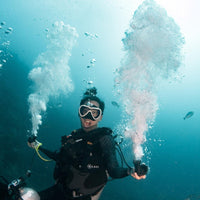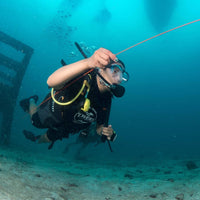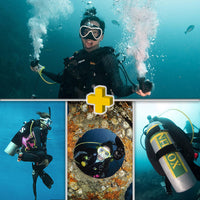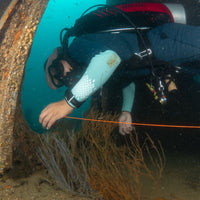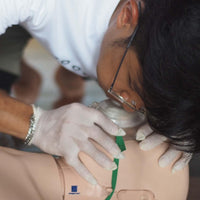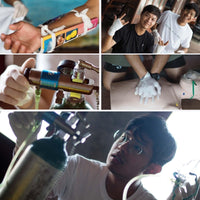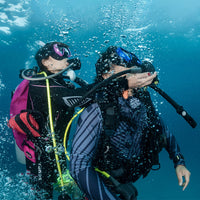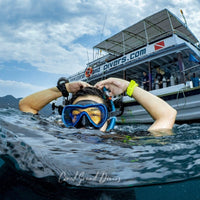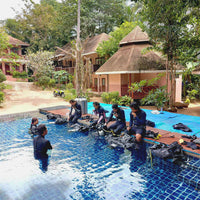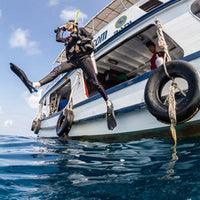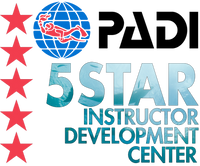PADI Diving Courses
PADI Diving courses
PADI (Professional Association of Diving Instructors) is the world's leading scuba diver training organization, offering various courses for individuals of all experience levels. Whether you're just starting your diving journey or looking to advance your skills, PADI has a course for you.
PADI Discover Scuba Diving
The PADI Discover Scuba Diving Program is an introductory dive program designed for individuals without Scuba Diving experience. It's great way to taste scuba diving before committing to a certification course.
During the Discover Scuba Diving program in Koh Tao, you will learn the basic safety guidelines and skills required to dive under the supervision of a PADI Professional. The session usually begins with a brief introduction to the equipment you will use and an explanation of basic diving principles.
Next, you'll practice essential skills in our on-site pool to ensure you're comfortable and ready for your open-water dives. These skills include breathing underwater, clearing water from your mask, and recovering your regulator.
Once you're confident with the basics, you’ll head out for actual ocean dives. These dives have a maximum depth of 12 meters (40 feet) and are always supervised closely by a PADI Professional.
The Discover Scuba Diving experience is a fantastic way to explore the underwater world for the first time. It's not a certification course, but your experience may count toward PADI Scuba Diver or Open Water Diver certification if you continue your training.
PADI Open Water
The PADI Open Water Course is the first complete, license-granting course in the PADI system. It's the world's most popular scuba course and has introduced millions of people to the adventurous diving lifestyle.
The PADI Open Water course in Koh Tao consists of three sections:
-
Knowledge Development: This phase is completed through eLearning self-study, allowing you to learn at your own pace. You'll cover the basic principles of scuba diving, including how pressure affects your body, managing buoyancy, planning dives, and understanding dive safety. You'll also learn about underwater navigation and the equipment you'll be using, including how to set it up and maintain it. This knowledge prepares you to dive confidently and safely.
-
Confined Water Dives: This section takes place in our on-site pool, where we’ll help you master essential skills for your open water dives. We’ll begin with basic exercises, like breathing through the regulator while standing, and then progress to underwater practice, where you’ll also work on equalizing. Your instructor will demonstrate each skill, giving you time to practice and perfect them. You'll learn key skills such as regulator clearing, mask clearing, using an alternate air source, buoyancy control, swimming techniques, body positioning, descent and ascent techniques, and underwater hand signals for communication.
By the end of the session, you’ll feel confident and prepared for your open water dives!
- Open Water Dives: The final step of the course takes you into the ocean for four supervised dives around Koh Tao's stunning dive sites. Here, you’ll apply the skills you mastered in confined water, such as buoyancy control, underwater navigation, and safety procedures, while exploring vibrant marine life and the underwater world.
Upon completing the course, you'll earn your PADI Open Water Diver certification, which allows you to dive independently with a buddy to a maximum depth of 18 meters (60 feet). This certification is recognized worldwide and is your ticket to a lifetime of underwater exploration.
PADI Advanced Open Water
The PADI Advanced Open Water course is designed to improve your underwater knowledge and skills. You can enroll in the Advanced Open Water course immediately after the certification of your PADI Open Water Diver.
Scheduled over two days, the PADI Advanced Open Water Diver Course course is as much about improving your underwater skills and learning new techniques as it is about having more fun, which when completed will give you a license to dive to a maximum depth of 30 meters (100 feet).
During your PADI Advanced Open Water Course in Koh Tao, you will take two compulsory dives, a Deep dive and an Underwater Navigation dive, plus any three further adventure dives of your choice:
Peak performance buoyancy, Wreck dive, Night dive, Fish identification, Underwater naturalist, Digital Underwater Photography, Search and Recovery, Rescue adventure dive, **Enriched Air Nitrox diver adventure dive.
Each Adventure Dive in the PADI Advanced Open Water course may credit toward the first dive of the corresponding PADI Specialty Diver course.
Emergency First Response - EFR
The Emergency First Response (EFR) Primary & Secondary Care course is designed to build confidence and readiness in handling medical emergencies. Ideal for anyone looking to gain essential life-saving skills, the course is not limited to divers but is required for those pursuing a Rescue Diver, PADI Divemaster, or Instructor certification. The EFR certification is also valuable beyond diving, providing the knowledge and confidence to manage emergencies in any setting.
The EFR course in Koh Tao encompasses two main components:
- Primary Care (CPR): This teaches you how to respond to life-threatening emergencies. The course focuses on primary care through knowledge development, skill development, and realistic scenario practice to ensure confidence in providing care when emergencies arise.
- Secondary Care (First Aid): This covers injuries or illnesses that are not immediately life-threatening. Participants focus on secondary assessment and first aid through knowledge development, skill development, and realistic scenario practice.
Key topics of EFR Course in Koh Tao include:
- The role of the first responder
- Recognizing an emergency
- Taking the decision to help
- Infection control
- Essential life support (CPR)
- Bleeding and shock management
- Illness assessment
- Injury assessment
- Bandaging and splinting
PADI Rescue Diver course
The PADI Rescue Diver course is designed to build on your existing diving skills, increasing both your competence and confidence while introducing new techniques that are essential for safe diving. Many divers consider the Rescue Diver course to be the most challenging they’ve completed, but it’s also one of the most rewarding, fun, and satisfying experiences. Throughout the course, you’ll learn how to handle emergencies both underwater and on the surface, improving your ability to stay calm, think clearly, and react appropriately in stressful situations. It’s a great way to enhance your diving skills, learn how to prevent and manage problems, and gain a deeper understanding of diver safety.
The PADI Rescue Diver course in Koh Tao combines theory (including EFR primary and secondary care if needed) with practical training, featuring confined training sessions and open water rescue scenarios. It provides an excellent foundation for progressing to your PADI Divemaster certification and taking the next step toward becoming a PADI Professional.
The PADI Rescue Course in Koh Tao covers:
-
Self-rescue: How to recognize and manage stress in other divers and rescue diver self-rescue.
-
Recognizing and managing stress in other divers: You'll learn to identify signs of stress and how to manage stressful situations.
-
Emergency management and equipment: The course covers handling emergency situations, including using available equipment.
-
Rescuing panicked divers: You'll learn techniques for dealing with a diver experiencing panic on the surface and underwater.
- Rescuing unresponsive divers: The course also covers how to rescue an unresponsive diver on the surface and underwater.
PADI Refresher course
The PADI Refresher Course is designed for certified divers who have not dived for a while and want to refresh their diving knowledge and skills. It's a quick and easy way to update your dive safety information and review the diving procedures.
The Refresher course in Koh Tao revisits essential skills like mask clearing, regulator recovery, air sharing, and buoyancy! It's customizable to your preferences, allowing practice on specific skills you feel need a bit more attention. Your PADI instructor will reintroduce you to all the basic notions and safety procedures you need to be familiar with when going diving.
Upon completion, you'll feel confident, safe, and ready for your next scuba diving adventure in Koh Tao!
PADI Specialties
PADI Specialty Diver courses are a great way to hone your skills and learn new ones. Each specialty focuses on a specific skill or type of diving, allowing you to explore your interests in more depth and become a more versatile diver.
There are a wide variety of PADI Specialty Diver courses to choose from, including:
- Deep Diver: Learn techniques for diving in the deeper range of 18-40 meters/60-130 feet.
- Wreck Diver: Learn how to explore shipwrecks safely.
- Night Diver: Discover what happens underwater after the sun goes down.
- Underwater Photographer: Learn how to take your photography skills underwater.
- Enriched Air Diver (Nitrox): Master the skills to safely dive with enriched air nitrox, allowing you to extend your no-decompression limits and maximize your bottom time.
- Peak Performance Buoyancy: Fine-tune your buoyancy and soar over reefs or perform better in underwater photography.
- Search and Recovery Diver: Learn practical ways to find objects underwater and bring them to the surface.
- Underwater Navigator: Learn how to navigate using kick-cycles, visual landmarks, and time.
- Project AWARE Specialist: Learn about the plight of worldwide aquatic ecosystems and how you can help preserve them.
Each PADI Specialty course in Koh Tao involves several dives and can be completed in as little as one to four days. Once you complete five specialty courses and have 50 logged dives, you can earn the prestigious Master Scuba Diver rating, the highest non-professional rank in the PADI system.


